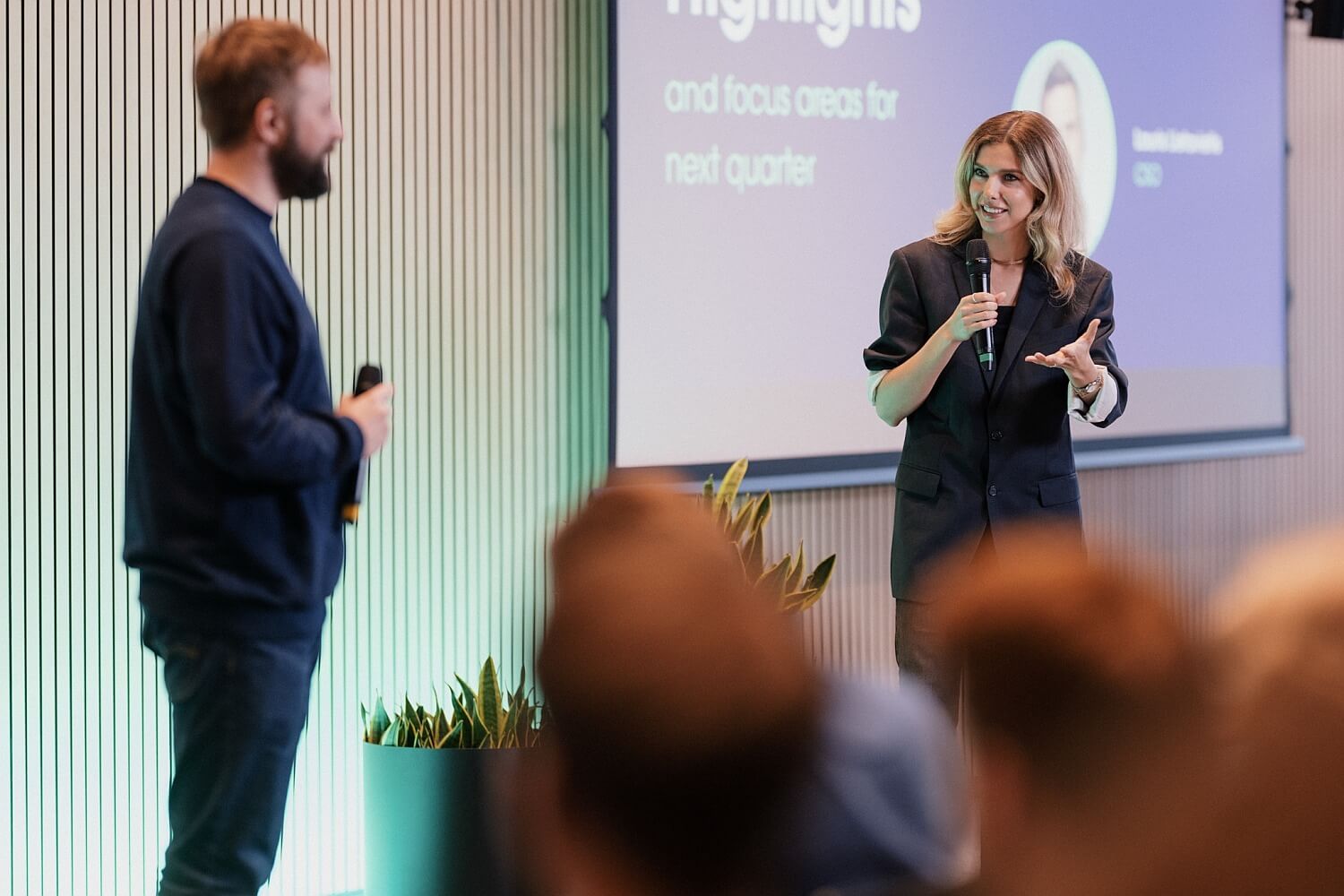


Gabrielė Montvilė, Oxylabs
"Back in school, the thought of studying anything tech-related never crossed my mind. I thought you had to be a real genius for that. From my experience, I can now confirm that the tech sector is not just about tech jobs. . Many people working in tech don't have an IT background: these are marketing specialists, lawyers, accountants, salespeople, business developers, and so on. As long as you have a goal, intrinsic motivation and you put the work in, you can learn anything -- and those who proactively solve problems stand out right away," Gabrielė notes.
Having started her professional life as a restaurant administrator in Vilnius, Gabrielė gained experience in global tech companies abroad. She has since returned to Lithuania and her example can inspire many — she is a business account manager of data scraping platform Oxylabs, a board member of the Unicorns Lithuania association, and a mentor at the Women Go Tech programme.
- Your story is an example of what we still lack in this country: you worked for global tech leaders, then came back to Lithuania and brought the know-how here. Tell us more about your career path — what did it look like?
- I graduated from high school in Vilnius and, when almost everyone in my circle went on to further education, I realised that I’d rather take a gap year to think about what I wanted to do. As I initially had no idea, I went to wait tables at the now-famous Stebuklai restaurant. A week passed, and my manager asked if I wanted to work as an administrator. Already at 19, I was overseeing a sizable team and handling key admin tasks. Maybe that was the first important lesson learned: "Say YES even when you doubt you're ready".
I then decided to study business administration. I moved to the UK and went to Warwick Business School. In Lithuania, finding a good hire can be challenging; meanwhile in the UK, the challenge is to select the best fit, as you might get 600 applications for one job opening. Recognising how competitive the job market is, I joined various associations like the Warwick Business School Society and TEDx Warwick. It helped me develop leadership skills outside academia and get some real-world experience. When I graduated, many of my coursemates were looking to kickstart their careers in banking, finance, or consulting, but I was drawn to tech. Microsoft was actually my first out-of-uni job.
- How does one land a job at Microsoft? What does the company look like from the inside? And what is it like to work somewhere like Microsoft or Salesforce, where your career continued?
- I don't have an awe-inspiring story — I applied, went through multiple interview rounds, and, in the end, got invited to join the team. Without much skill or experience yet, you can end up in one department or another.. At Microsoft I worked with sales, customers, and business solution services in the EMEA region. I travelled extensively, helping local businessesto use Microsoft solutions effectively.
As time went by, I realized that Salesforce is the market leader in Customer Relation Management (CRM), , so I applied and was eventually invited to join their team. I moved to London and worked with major corporate clients in the UK and Ireland. One of the most memorable things was when, as a reward for good resulrs, a few of us were invited to join top executives for strategic goal planning in Hawaii. There I also had the chance to personally meet Marc Benioff, the CEO of Salesforce.
Working for tech pioneers and leaders has many advantages - you're surrounded by top talent, a strong leadership culture, a solid value base, and a very healthy and respectful attitude toward employees. Furthermore, you get progressive and innovative benefits from a great office and technological solutions to additional growth opportunities. However, compared to working for a startup, your responsibilities are narrower, influence limited, processes take more time and change is harder to achieve. Accordingly, your career advances more slowly.

- What were the main reasons that brought you back to Lithuania? Maybe your answer could help us attract more top-notch talent from abroad to Lithuania. What could work?
- I lived in the UK for about 7 years, 3 of them in London. To be honest, eventually I just got tired of the big city, the pollution, the hectic pace of work... At the same time, my family wasn't doing well health-wise, and I wanted to be closer to them. The pandemic still dictated a lot of things back then.
The more you travel, the more you appreciate Lithuania and its advantages - its cleanliness, its climate, its optimal size, its balance between city life and nature. When I decided to return, I feared not finding an interesting job. I didn't know the market well, but I was quick to find out the abundance of tech companies working with global markets. Experience gained abroad is held in high regard here. Here, I was not only able to apply my knowledge, I could also accelerate my career faster than in London. Today, I manage two departments and a team of 40 people. Lots of opportunities opened up to me.
- What can startups, young businesses and their founders learn from the major leaders in tech?
- Companies like Salesforce and Microsoft stand out for their customer centricity. It should be a top priority for any business. After all, customers are the ones who pay. If your services or products don't create added value and don't address customers' needs, they'll leave. And that impacts both your profitability and growth potential. The companies we're talking about develop and improve solutions and technologies based on customer needs and feedback. This approach has become part of my DNA, and in my opinion, it should be adopted by every business operating in Lithuania.
What I found lacking in Lithuania is maturity in management - things like empathy, communication skills, and so on. We do achieve results, but we take a different path towards them. Western working practices make employees feel seen, valued and included. I would say that this difference is due to our country's history and culture - it was not common to talk about emotions even at home, let alone at work: we work, we get the job done, and that’s that. However, a crucial part of work experience comes through training and internships - something that Oxylabs and other internationally minded players are focusing on today. Thus, the situation is changing rapidly in the last few years, especially in the startup sphere, but if we take Lithuanian businesses as a whole, there's still room for improvement.
- When you came back to Lithuania, first you joined Telesoftas and then Oxylabs, right? In your experience, what are the differences between working in tech companies and in startups?
- I quickly busted the myth that Lithuania had no global companies and opportunities for growth. Not long after coming back to Lithuania, I started working for Telesoftas as a Key Account Manager. About a year later, Oxylabs invited me to join the team as Head of Account Management. I had maybe 5 job interviews, and I had a lot of questions myself: they saw my potential to go from being a specialist to a manager. There was a lot of tension and uncertainty, but after 1.5 years I was promoted to Chief Customer Officer — my career trajectory went from working directly on day-to-day tasks to developing strategies, monitoring market trends, adapting the product to customer needs, helping the company stay competitive, and so on.
In my opinion, people who want to work in startups need to be prepared for a fast-changing environment, really diverse tasks and intense work. Such an environment requires flexibility, commitment and a willingness to continuously improve. Here, you can’t avoid fast pace and the need to perform different functions. At the same time, startups value initiative and autonomy, resilience to stress and uncertainty, teamwork skills, the ability to learn from mistakes, and tech literacy. Finally, you have to be passionate about the product or the company's mission, and you have to be results-oriented.. When hiring, I look for people who have a "can-do" mentality, are responsible, have a positive attitude toward change, have professionalism, and high standards, among other qualities.
- You have been working for Oxylabs for almost three years now. Can you tell us where this whole data sector is headed? Working with data has both challenges and opportunities — what are your personal discoveries here?
- Today, the Oxylabs group is helping businesses to address the key challenges of public data gathering. More than 3.5 thousand clients from 80 countries around the world already use our patented solutions developed in Lithuania, and dozens of those clients are on the Fortune Global 500 list. Oxylabs has been ranked by the Financial Times as one of Europe's fastest-growing companies for the past three years in a row and has a portfolio of over 100 patents registered in the US and Europe.
Data drives almost everything businesses do — it's at the core of market analysis, ensuring competitiveness, developing products, and the list goes on. I'm convinced that in the long run, data will be the main driver of success across all industries. We see a growing demand for this.
Until now, we have been mostly working with e-commerce, travel, marketing, and cybersecurity companies. Today, we're seeing increased interest from the AI industry. The first step in building or training a high-quality model requires analysing huge amounts of data — something our technical capabilities allow us to do. Real estate is another growing market. The collection of public data is useful for analysing the property market: compiling directories of rental and for-sale properties, operating private equity and asset management funds, and so on. Other opportunities that interest me are safeguarding brands, their IP and reputation online, identifying fake websites, and fighting fraud.
- Could you also share some professional tips on how to work effectively with clients?
- First, don't limit yourself to the local market — you have to start with a global mindset. Of course, having a high-quality and reliable product is crucial. Regardless of what you do, if you don't have a reliable, working, and stable product, you won't succeed. The third most important thing is flexibility — you have to develop your ability to adapt to different cultures and communication styles. I would also highlight the importance of personal connections.Until you get to know the client, you are only a face in the crowd, so it's really worth investing in meetings, trips, and events. It really pays off for us at Oxylabs. Then you have tactical steps: developing uniform high standards for customer service and communication, tracking progress, etc.

- And what are your personal principles that guide you in your daily life and work?
- Perhaps one of the most important principles I follow is speed in the broadest sense: from reacting quickly to problems to taking quick decisions. And my career path has been fast, with sudden jumps. Although it suits my personality and helps me grow, it's also been a lot of hassle — you're always in action, you're always facing challenges. Another principle I would like to highlight is flexibility, which I mentioned before. Things change, so you have to be able to adapt, cut through the noise, take responsibility and solve the problem. Also, I try to develop my teams by example, always going the extra step. Do you see a way to improve something? Team members have complete freedom to take the initiative and implement change.
- What do you think we should do to increase the number of high value-added talents and startups in Lithuania? In the spring, you were also elected to the board of the Lithuanian startup association Unicorns Lithuania — where will you focus your attention?
- If we want to empower the tech sector and stimulate innovation, we need to accelerate the growth of our startup ecosystem. Firstly, to bring the technology community together, creating a platform for faster growth and solving common problems, and secondly to improve the business environment. The long-term goal is also to build a globally competitive education system: strengthening STEM (science, technology, engineering and maths) education, reducing the fear of failure, integrating entrepreneurship and innovation training, and supporting mentoring and networking opportunities. The focus during this Board's term will be on changes that will accelerate the growth and competitiveness of the technology sector and create favourable conditions for the emergence of future unicorns in Lithuania.
- You are constantly in touch with different startups, investors and top IT talent - how do you see the startup environment in 2025? What long-term trends can you point to?
- I notice that investment markets are slowly stabilising and starting to grow, which means that there are again increasing opportunities for startups to attract investment and grow their businesses. On the other hand, investors are now more interested in startups that can achieve profitability at low cost and generate a return, rather than in idea-driven startups. At the same time, more and more businesses are seeing revenue as their main fuel for growth — meeting the expectations of customers rather than investors. This often means slower but more sustainable growth, based on innovatively addressing customer needs.
And it's no surprise that investors are paying increasingly more attention to AI startups. The question remains regarding how to unlock the full potential AI has in real-world situations — healthcare, education, climate change, and so on. A similar principle can be seen in the talent market. AI will not replace employees, but it is becoming an important tool in their daily work. I would say that skills such as decision-making, communication, adaptability to change, collaboration, etc. will all become increasingly important. For large companies, these skills are indispensable, even with unlimited AI resources.
